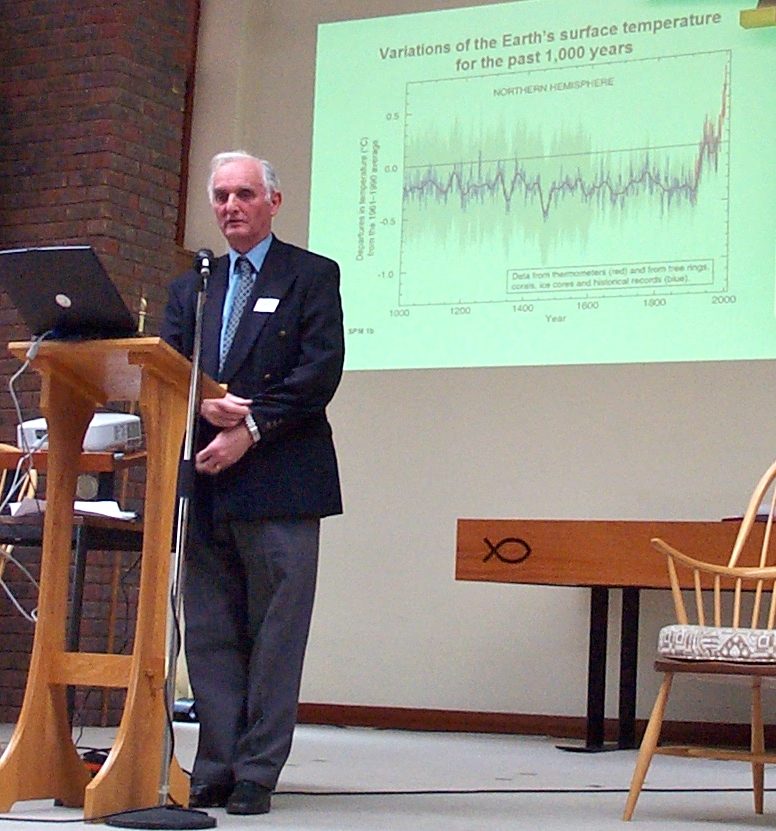
IPCC Third Assessment Report
The IPCC Third Assessment Report (TAR), Climate Change 2001, is an assessment of available scientific and socio-economic information on climate change by the IPCC. Statements of the IPCC or information from the TAR were often used as a reference showing a scientific consensus on the subject of global warming. The Third Assessment Report (TAR) was completed in 2001 and consists of four reports, three of them from its Working Groups: Working Group I: The Scientific Basis;[1] Working Group II: Impacts, Adaptation and Vulnerability;[2] Working Group III: Mitigation;[3] Synthesis Report.[4] A number of the TAR's conclusions are given quantitative estimates of how probable it is that they are correct, e.g., greater than 66% probability of being correct.[5] These are "Bayesian" probabilities, which are based on an expert assessment of all the available evidence.[6][7]
"Robust findings" of the Synthesis Report include:
The IPCC was established in 1988 by the United Nations Environment Programme (UNEP) and the UN's World Meteorological Organization (WMO) "... to assess scientific, technical and socio-economic information relevant for the understanding of climate change, its potential impacts and options for adaptation and mitigation."[10] The IPCC is organized as three working groups (WG) and a task force [1]:
WG I covers the same areas as the Second Assessment Report (SAR) of 1995, but WG II & III cover slightly different areas in the TAR.
Projections[edit]
Projections are used in the TAR as a guide to the possible future effects of climate change, e.g., changes in global mean temperature and sea level.[14] In the TAR, the word "projection" is favoured over "prediction".[15] This is because many future changes related to climate are highly uncertain.[16] For example, climate change projections are affected by highly uncertain changes in future GHG emissions.[17]
The TAR projects impacts according to possible future changes in global mean temperature.[18] Other projections are based on scenarios that the IPCC has developed.[14] In 2000,[19] the IPCC published 40 different scenarios[20] (the "SRES" scenarios) which contain estimates of future changes in anthropogenic emissions of greenhouse gases and aerosols. The SRES scenarios project a wide range of possible changes in future social and economic development,[20] and projected climate change impacts vary according to the scenario considered.[21] The IPCC has not assigned probabilities to the 40 SRES scenarios.[21] Some authors[22][23] have argued that some SRES scenarios are more likely to occur than others.
Reception[edit]
Endorsements[edit]
In 2001, 16 national science academies issued a joint statement on climate change.[29]
The joint statement was made by the Australian Academy of Science, the Royal Flemish Academy of Belgium for Science and the Arts, the Brazilian Academy of Sciences, the Royal Society of Canada, the Caribbean Academy of Sciences, the Chinese Academy of Sciences, the French Academy of Sciences, the German Academy of Natural Scientists Leopoldina, the Indian National Science Academy, the Indonesian Academy of Sciences, the Royal Irish Academy, Accademia Nazionale dei Lincei (Italy), the Academy of Sciences Malaysia, the Academy Council of the Royal Society of New Zealand, the Royal Swedish Academy of Sciences, and the Royal Society (UK).[29]
The statement, also published as an editorial in the journal Science, stated "we support the [TAR's] conclusion that it is at least 90% certain that temperatures will continue to rise, with average global surface temperature projected to increase by between 1.4 and 5.8 °C above 1990 levels by 2100".[30]
The TAR has also been endorsed by the Canadian Foundation for Climate and Atmospheric Sciences,[31] Canadian Meteorological and Oceanographic Society,[32] and European Geosciences Union[33] (refer to "Endorsements of the IPCC").
In 2001, the US National Research Council (US NRC)[34] produced a report that assessed Working Group I's (WGI) contribution to the TAR. US NRC (2001)[35] "generally agrees" with the WGI assessment, and describes the full WGI report as an "admirable summary of research activities in climate science".[36]
IPCC author Richard Lindzen has made a number of criticisms of the TAR.[37] Among his criticisms, Lindzen has stated that the WGI Summary for Policymakers (SPM) does not faithfully summarize the full WGI report.[37] For example, Lindzen states that the SPM understates the uncertainty associated with climate models.[37] John Houghton, who was a co-chair of TAR WGI,[38] has responded to Lindzen's criticisms of the SPM.[39] Houghton has stressed that the SPM is agreed upon by delegates from many of the world's governments, and that any changes to the SPM must be supported by scientific evidence.[39]
IPCC author Kevin Trenberth has also commented on the WGI SPM.[40] Trenberth has stated that during the drafting of the WGI SPM, some government delegations attempted to "blunt, and perhaps obfuscate, the messages in the report".[40] However, Trenberth concludes that the SPM is a "reasonably balanced summary".[40]
US NRC (2001)[41] concluded that the WGI SPM and Technical Summary are "consistent" with the full WGI report. US NRC (2001)[36] stated: